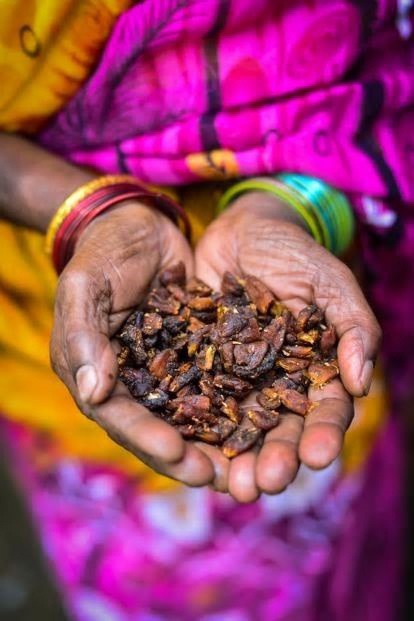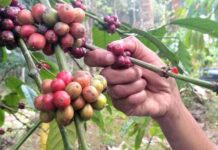Sustaining over 30 crores of forest dwelling population in India is a challenge. The strategy to address this challenge has to take into account the potential of those forest dwelling communities and the immediately available resources for livelihood. Minor Forest Produce (MFP) is one such opportunity which can turn around the prospects of 10 crore MFP collectors and would also be able to generate employment opportunities nationwide.
There are over 1200 forest produce including medicinal and aromatic plants, oil seeds, wild spices and condiments, edible shoots, fruits and flowers, leaves for plate making, barks, roots, etc. traded across India.
National level trade and export of raw herbal drugs is to the tune of 5 lakh MT annually, and it generates more than 1 Billion USD. Two forest produce procured through monopoly system namely Tendu patta and Bamboo play a major role in economy of tribals. On an average each tribal household annually earns in a range of Rs 20,00 to Rs 40,000 from harvesting of tendu patta and bamboo in states such as Madhya Pradesh and Chhattisgarh. There are several other MFPs which substantially contribute to the tribal household economy such as Sal leaves, Sal seeds, Mahuwa flowers, Tamarind, etc. in Schedule V states including Madhya Pradesh, Chhattisgarh, Odisha, Jharkhand, Telangana, and parts of states such as Maharashtra, Andhra Pradesh, Gujarat, Rajasthan.
Demand of medicinal plants has seen multi-fold increase over past decade (Ved and Goraya, 2008) [i]. The export of plant based drugs has increased 138% from 56,500 MT to 1,34,500 MT during the period 2004-05 to 2014-15. There has been a substantial increase in domestic use of herbal products in urban areas due to a number of companies manufacturing and marketing these.
The unorganised nature of MFP trade shows enormous price variation. The price of the raw MFP changes at every stage from point of first sale till it reaches for final use. At the final trading point the price turns out to be 5-6 times of the price at first point of sale. So far there are no standards developed for collection, storage, and transit of MFPs. The prices also varied as per the quality of the MFP which is decided by the markets and end users.
Increase in demand has also influenced the prices of MFPs especially selected medicinal plants. But for most of the MFPs there were no standardized pricing norms. This leds to exploitation of the primary collector. The unregulated pricing regime did not recognize skills involved in the collection, there was no protection from any risk during collection and there was not even a matching compensation for the efforts made in collection.
To tackle this exploitation of the primary collectors provision of Minimum Support Price (MSP) was initiated in 2013-14 by Ministry of Tribal Affairs (MoTA) at national level for 10 MFPs such as Tamarind, Wild honey, Sal seeds, Sal leaves, Mahua seeds, Chironji , Lac etc., and in subsequent years, 13 more MFPs have been added. But fixation of MSP has been done with limited supporting information. To overcome this drawback TERI [ii] has recently demonstrated methodology based on several parameters as follows – estimated cost of labour, paid out costs including risk insurance, premium for knowledge / skill, owner’s royalty and adjustment to the inflation using Consumer Price Index for Agriculture labour. The methodology has been developed based on a robust study of 12,000 households, work studies – from collection to the sale of MFPs of 1200 MFP collectors and more than 100 Focussed Group Discussions conducted in nine Schedule V states in the country. Through recent notification dated 26th December 2018 Ministry of Tribal Affairs has introduced MSP for additional 17 MFPs and revised MSP for 23 MFPs. These calculations are based on the work done by TERI.
Providing MSP becomes the first step in the entire process of tackling exploitation of the MFP collectors. MoTA has also launched scheme for establishing 5000 local Haats for procurement of the MFPs under MSP regime. The price of the raw MFP gets enhanced when value addition takes place. Through Van Dhan Yojana MoTA is planning to support community level MFP processing centres. But to realise the benefit from value addition, there is also a need to provide cost effective certification system for value added MFPs and an interactive marketing platform. Developing MSP regime through organised process of collection, value addition and marketing of the MFPs would enhance livelihood of 30 crores of forest dwelling population by generating opportunities for employment enterprise development.
TERI study also highlights unsustainable harvesting of MFPs as a major concern. Because of which many medicinal plants such as Gloriosa superba, Safed musali, etc. are sourced mainly through cultivation to suffice increased demand. Unsustainable harvesting cannot be controlled only through rules and regulations. Local institutions need to create the stake over management of MFP resources and the sustainable harvesting by exercising the legal provisions under FRA and PESA. Nistar rights along with bamboo and tendu patta management in Gadchiroli district, customary protection to Mahua trees in and around village commons in central India are some of the examples.
While the government has provided MSP, but there is a long path of livelihood and resource sustainability which is plausible and hence, needs to be walked by government and the communities together.
About the Author
Dr Yogesh Gokhale is currently works as Fellow with The Energy and Resources Institute (TERI), New Delhi. He has more than 15 years of experience of working on diverse aspects of natural resource management, monitoring, and evaluation of watershed projects and ecological assessments of various ecosystems in different parts of India.
He has extensively worked on people and forest interface issues regarding conservation of biological resources such as sacred groves in India for past several years. Some of his research topics include forest ecology, non-timber forest produce, medicinal plant conservation, community forestry, eco-development, and national and international biodiversity policy issues.
Dr. Gokhale completed his postdoctoral work at the Indian Institute of Science, Bangalore on biodiversity policy. Before joining TERI, he worked with the Ministry of Environment, Forest and Climate Change, Government of India, on the issues related to Convention on Biological Diversity.
At TERI, he is involved in a number of projects mainly related to natural resource management, carbon forestry, impact assessments, and biodiversity conservation.
[i] Ved D K and Goraya G S (2008) Demand and Supply of Medicinal Plants in India. Publisher Bishen Singh Mahindra Pal Singh, Dehradun pp. 216
[ii] Sharma J V, Gokhale Y, Jain N, Lele Y, Tyagi A and Bhattacharjya S (2018) Methodology for determining Minimum Support Price for Minor Forest Produce in India. Indian Forester, 144 (7) : 604-610, 2018.














